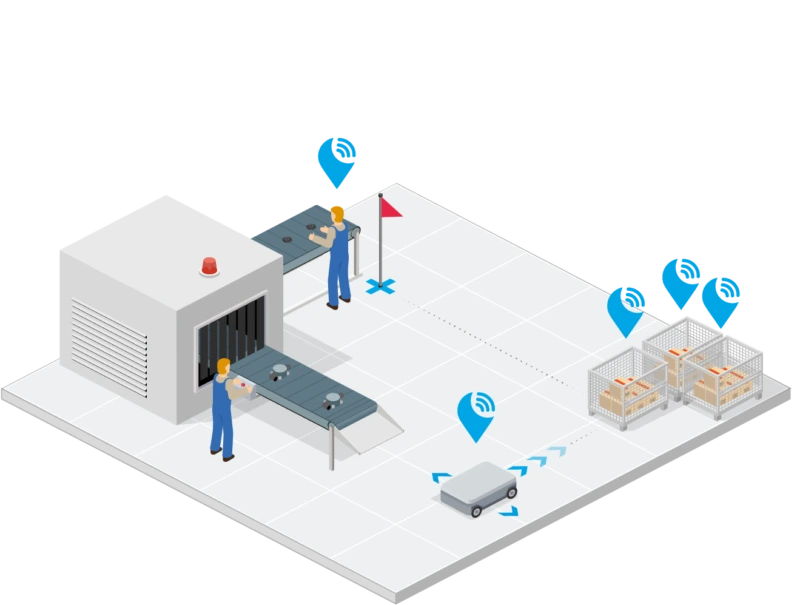New EU Decision on Ultra-Wideband Technology: What It Means for Your Operations in Manufacturing and Logistics
Learn how the recent EU Commission Implementing Decision 2024/1467 introduces key updates that impact operations, especially for those working with ultra-wideband (UWB).

Key Updates on Commission Implementing Decision (EU) 2024/1467 and Its Impact on Manufacturing and Logistics
What is the Decision About?
The Commission Implementing Decision (EU) 2024/1467 is an update to earlier regulations regarding the use of ultra-wideband (UWB) technology in the EU. It amends the 2019/785 decision and focuses on harmonizing radio spectrum use for devices that operate with UWB technology. The decision addresses technical specifications and regulatory guidelines that aim to ensure the efficient and safe use of UWB across different sectors, like telecommunications and vehicle technologies.
For your daily operations, this decision might impact how UWB-based devices are integrated, especially regarding spectrum usage rules and compliance with EU standards for wireless communications. It could affect the deployment of devices like RTLS (Real-Time Locating Systems) or other tracking tools that use UWB, ensuring their interoperability and regulatory alignment across the EU.
Key Points
- Harmonization of standards: The decision ensures that UWB equipment operates under unified technical conditions across the EU. This harmonization is crucial for eliminating barriers and promoting the widespread adoption of UWB technology.
- Managing interference: Although UWB signals are low power, there’s a potential for interference with existing radiocommunication services. The decision includes measures to prevent harmful interference, particularly with services like radio astronomy, earth exploration satellites, and space research systems.
- Benefits: By fostering a harmonized environment, the decision aims to create significant economies of scale and consumer benefits. It’s about balancing the need for innovative technology with the protection of existing services.
- Compliance and monitoring: Equipment and processes will need to comply with the updated technical standards. Regular monitoring and reporting will be necessary to ensure compliance and avoid any operational disruptions.
Impact on Daily Operations in Manufacturing and Logistics
The Commission Implementing Decision (EU) 2024/1467 primarily affects the use of ultra-wideband (UWB) technology in manufacturing and logistics by setting updated rules on the use of radio spectrum across the EU. Here's how it can impact daily operations in these sectors:
- Improved compliance: Companies using UWB-based devices such as real-time locating systems (RTLS) for asset tracking and automation must ensure compliance with the new spectrum harmonization rules. This may require updates to devices or configurations to align with new technical specifications.
- Operational efficiency: With clear guidelines on UWB spectrum usage, logistics and manufacturing environments can expect more reliable and interference-free performance of UWB devices, which are used for tracking tools, equipment, and vehicles. This enhances real-time visibility and movement tracking of materials.
- Scalability: As UWB technology is harmonized across the EU, manufacturers and logistics providers can scale their UWB applications across different countries more easily, knowing their technology meets regulatory standards everywhere.
- Reduced downtime: By adhering to the new rules, businesses can minimize disruptions or regulatory penalties associated with non-compliant devices, leading to smoother and uninterrupted operations.

KINEXON’s Role in Supporting EU Decision 2024/1467 Compliance
As a leader in UWB RTLS technology, KINEXON is positioned to help businesses navigate the changes brought by EU Decision 2024/1467. This includes ensuring that UWB equipment meets the new harmonized technical standards across the EU, addressing potential interference issues, and providing education and training to help stakeholders stay compliant. By collaborating with regulators and driving innovation, KINEXON ensures a smooth transition to the updated regulatory framework, supporting the growth and interoperability of UWB technology in Europe.
- Regulatory compliance: KINEXON’s expertise ensures businesses remain compliant with the latest UWB regulations, avoiding disruptions or penalties. The team offers advice on adjusting systems and operations to align with new spectrum rules.
- Seamless technology integration: With in-depth knowledge of real-time locating systems (RTLS), KINEXON helps companies implement and enhance tracking solutions, improving asset visibility, material flow, and inventory management.
- Maximized efficiency: KINEXON’s solutions, such as RTLS Pro, deliver real-time data on asset movements, reducing search times, increasing inventory accuracy, and improving decision-making in logistics and manufacturing.
- Future-proofing: By guiding businesses in scalable UWB technology deployment, KINEXON ensures compliance not just today but also adaptability to future regulatory changes and advancements.
- New outdoor use cases: With new regulations in place, KINEXON UWB fixed anchors can now be installed outdoors in factories and warehouses, enabling new opportunities for yard and outdoor tracking, leading to greater efficiency and cost savings.
While these changes may require operational adjustments, they ultimately streamline processes and foster innovation.
Interested in learning more?
Contact one of our UWB experts to discuss how KINEXON can help your business.
For further details, please refer to the official EU document.
More Resources
Stay Up to Date
Subscribe to our newsletter and stay connected. You can unsubscribe at any time.
Ready to automate your industrial operations?
Schedule a meeting with our experts to connect and automate your operations.
Get in touch